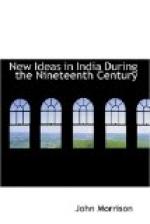New ideas in the social sphere first claim our attention. The individual and the community, each have rights, says a writer on the philosophy of history, and it is hurtful when the balance is not preserved. If the community be not securely established, the individuals will have no opportunity to develop; if the individual be not free, the community can have no real greatness. Speaking broadly, when Western social ideas meet Indian, the conflict is between the rights of the individual as in Western civilisation, and the rights of the community or society as in the Indian. India stands for the statical social forces, modern Europe for the dynamical and individualistic. In India, as in France before the Revolution, certain established usages are prejudicially affecting the progress of the individual, fettering him in many ways. I refer to caste, the denial of the brotherhood of mankind, the artificial barricading of class from class, the sacrifice of the individual to his class—condemned by native reformers like Ramananda, Kabir, Nanak, and Chaitanya long before the advent of European ideas. Whatever the origin or original advantages of the caste system, it has long operated to repress individuality.[9] It is a vast boycotting agency ready to hand to crush social non-conformity.[10] One can easily understand that if society is rigidly organised for certain social necessities (marriage for example) into a number of mutually exclusive sets or circles, admission to all of which is by birth only, an individual cast out from any set must perish. No one will eat with him, no one will intermarry with him or his sons and daughters. It is into such a society that modern social ideas have been sown, the ideas let us say of John Stuart Mill’s book, On Liberty—the individual’s liberty, that is to say—which used to be a common university text-book in India.
[Sidenote: Caste suggests an imperfect idea of the community.]
[Sidenote: Nevertheless, a practical solidarity in Hinduism.]
Besides setting the community too much above the individual, the caste system is faulty in presenting to the Indian mind an imperfect idea of the community. The caste is the natural limit to one’s interest and consciousness of fellowship, to the exclusion of the larger community. According to Raja Rammohan Roy, writing in 1824, the caste divisions are “as destructive of national union as of social enjoyment.” In Modern India, Sir Monier Williams expresses himself similarly. Caste “tends to split up the social fabric into numerous independent communities, and to prevent all national and patriotic combinations.” Too much, however, may be made of this, for the practical solidarity of Hinduism, in spite of caste divisions, is one of the most striking of social phenomena in India. Whatever may have brought it about, the solidarity of Hinduism is an undeniable fact. The supremacy of the priestly caste over all may have




